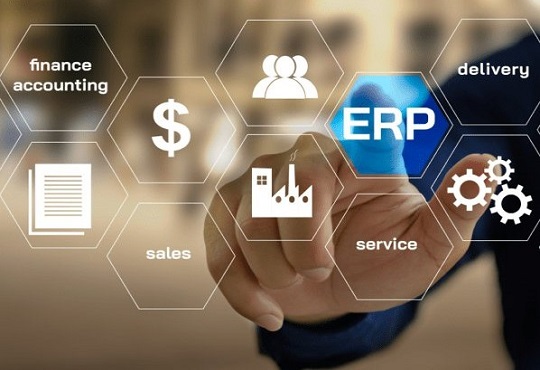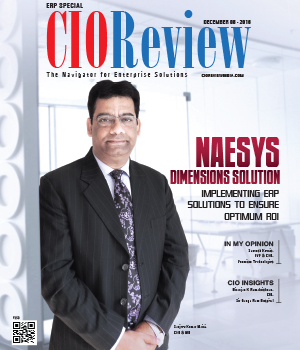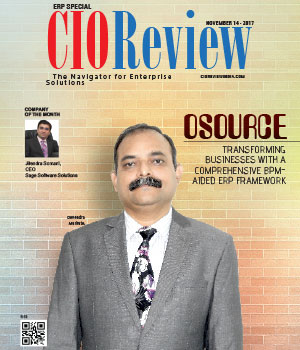Unleashing the power of Data Analytics in ERP
Janifha Evangeline, Assistant Editor, CIOTechOutlook | Sunday, 14 January 2024, 18:46 IST

SAP has launched AI-powered productivity tools with an aim to help developers, vector database features in order to facilitate AI model building & ‘AI Foundation’, by doubling down on its efforts in the artificial intelligence space. This will be a one-stop-shop for developers for creating Artificial Intelligence and generative AI-powered applications as well as extensions by leveraging a range of available large language models on SAP Business Technology Platform.
“As much as 65-70 per cent of German business software giant SAP’s cloud-based solutions adoption in the Asia Pacific and Japan region comes out of India. Today, if you look at our ERP (enterprise resource planning) cloud version, India's is one of the fastest market growths that I'm seeing, highest adoption in the world said Kulmeet Bawa, president and managing director, SAP Indian Subcontinent.
“India has been SAP’s fastest growing market for the last three years, and this pace is expected to continue. India is a ‘rocket ship’. Further, SAP looks to double its presence in the mid-market going forward. This critical segment has seen 700 percent growth in the last 2-3 years,” he told ET in an interview.
Organizations today are looking for numerous ways of gaining competitive edge in order to make informed decisions since it is a data-driven business landscape. This is where data analytics comes into picture. The amalgamation of ERP software & data analytics renders a powerful combination that facilitates businesses in leveraging data effectively.
When integrated with ERP systems, data analytics helps the firms to tap into the humungous amount of data that is collected and stored within the ERP system. Furthermore, by applying advanced analytics techniques, that include predictive modeling, data mining, and ML, firms today can extract valuable insights from their ERP data for driving decision-making.
In this article, we will delve on how ERP and data analytics work together, and how this convergence empowers firms in harnessing the power of data for informed decision-making.
Real-time visibility and Reporting & Predictive analytics for forecasting & planning
An important advantage of merging ERP with data analytics is its ability to accessing real-time visibility & reporting. ERP systems work as a centralized repository of business data. They capture information from numerous departments as well as processes. By using data analytics tools & techniques, firms can generate real-time reports & dashboards that help in obtaining a comprehensive view of the organizations’ operations. And, this in turn facilitates stakeholders to make data-driven decisions which are based on accurate and up-to-date information.
“An ERP system is one of a company’s most valuable business investments, and payables departments need to have an integrated philosophy that encompasses the entire end-to-end process,” says Tipalti’s Chief Product Officer, Roby Baruch.
Predictive analytics algorithms help in forecasting the future trends, by identifying patterns & expect potential outcomes and this is done by analyzing historical & real-time data. This helps in empowering companies in making proactive decisions, optimizing resource allocation as well as planning effectively for future scenarios. Predictive analytics helps firms to stay ahead of the curve whether it is about demand forecasting, or inventory planning or even workforce optimization.
Identifying key performance indicators & Data Driven Process Optimization
Data analytics within an ERP system helps firms in determining & monitoring KPIs that are critical to their business objectives. Every company can track its performance metrics, measure the progress, as well as evaluate the success of their strategies by defining relevant KPIs & utilizing data analytics tools. ERP data analytics offers insights into areas of strength & opportunities for improvement, be it measuring sales performance, manufacturing efficiency or even customer satisfaction.
ERP software is basically designed for streamlining & automating the business processes. When this software is combined with data analytics, it helps companies to optimize these processes further. By analyzing data from several sources, firms can determine bottlenecks, the inefficiencies and segments for enhancement. Data-driven process optimization helps businesses in streamlining the workflows; decrease costs, and improve the productivity. With the help of continuous monitoring & analysis, firms can iteratively enhance their processes & drive operational excellence.
“Customers today demand agile, rapid solutions, including real-time customer buying insights and speedy product deliveries. To fulfill this demand, SAP offers optimal solutions for warehouse digital transformations, including automation,” says C K Reddy, Founder & CEO, Artihcus Global.
“Moreover, warehouse staff follow manual procedures and initially struggle with technology adoption, such as SAP EWM,” he adds.
Business Intelligence for Strategic Decision Making
The convergence of ERP and data analytics empowers companies with improved BI capabilities. BI tools when integrated with Enterprise Resource Planning systems help users in exploring data, creating interactive visualizations as well as gain deeper insights into their business functions. These insights lead to making strategic decisions at every level of the firm right from operational enhancements to long-term strategic planning. By using ERP data analytics, firms can make informed decisions which align with their overall business goals and promote sustainable growth.
Epicor’s Kinetic Cloud ERP platform is listed as a visionary in Gartner’s latest evaluation of ERP vendors. Gartner says Kinetic “delivers a solid operational ERP solution for midmarket manufacturing and distribution companies, along with adjacent capabilities for demand planning, inventory and warehouse management.”
ERP systems when coupled with data analytics they become indispensable tools for companies looking to leverage the power of data for informed decision-making. By amalgamating the centralized data management capabilities of Enterprise Resource Planning software with the analytical power of data analytics, firms cannot only extract valuable insights, but also achieve real-time visibility, optimize processes & improve their overall performance. In the current data-driven world, utilizing the power of ERP & data analytics is one of the strategic imperatives for companies that are looking to stay competitive & drive success.
CIO Viewpoint
ERP Systems Evolving to Improve Business Agility
By Abhrasnata Das
Transforming Manufacturing by Creating a...
By Thiagarajan N, Director IT at IMI Critical Engineering
How Reliance Entertainment leverages SMAC and...
By Sayed Peerzade, Group CIO, Reliance Big Entertainment & Reliance Entertainment - Digital
CXO Insights
Hit Reset with Technology as the Trusted Advisor
By Guruprasad Gaonkar, APAC SaaS Leader - Office of Finance (ERP) & Digital Supply Chain, Oracle
ERP Implementation: The Pitfalls to Avoid
By By Navjot Singh Sidana, General Manager – ERP, Delhi Integrated Multi-Modal Transit System (DIMTS) Ltd.
Power And Water Nexus Central To Data Center...




.jpg)





